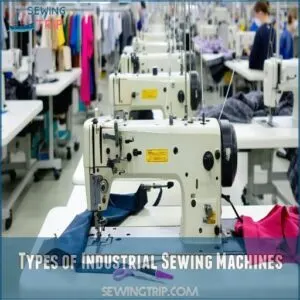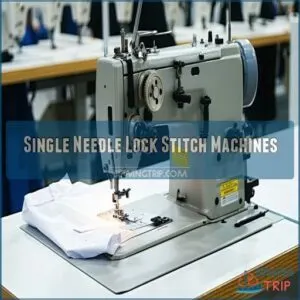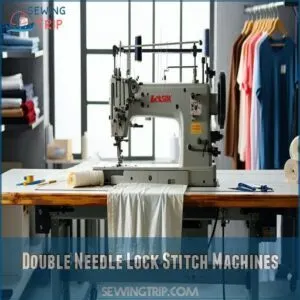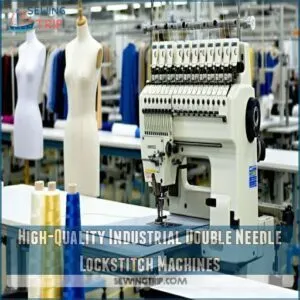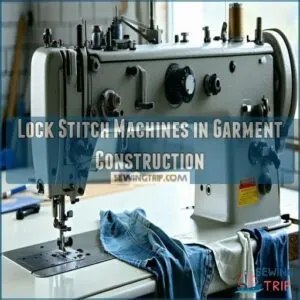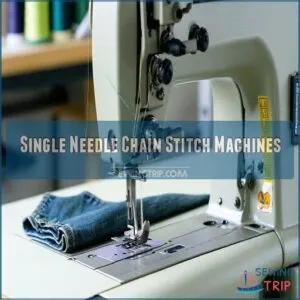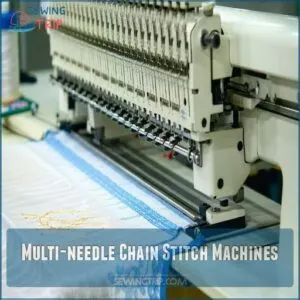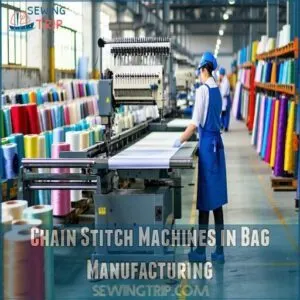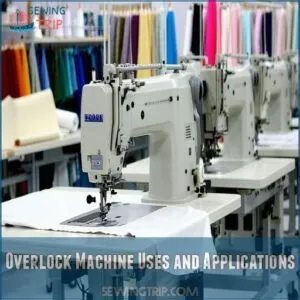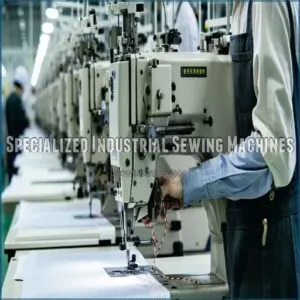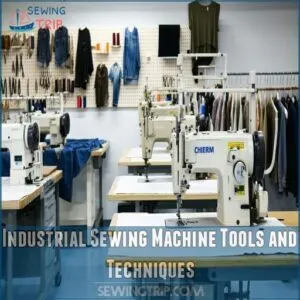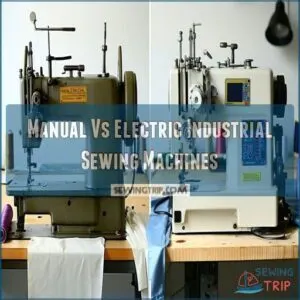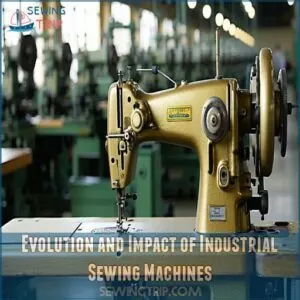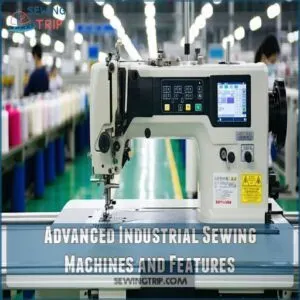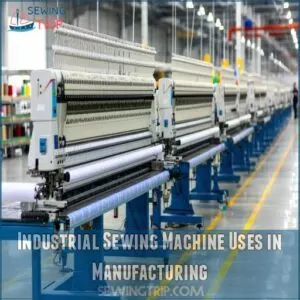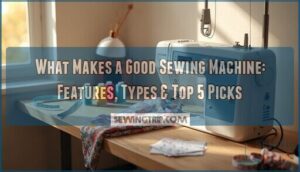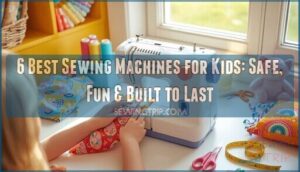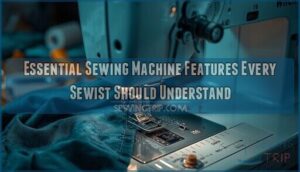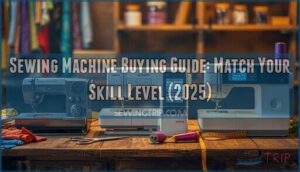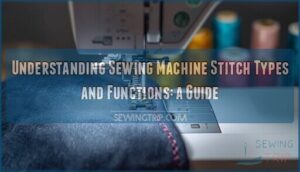This site is supported by our readers. We may earn a commission, at no cost to you, if you purchase through links.
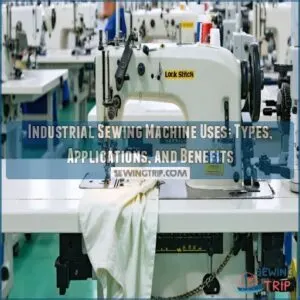
You’ll find specialized machines like lock stitch for durable seams, chain stitch for knitted wear, and overlock for preventing fraying. Whether you’re manufacturing T-shirts, creating seamless activewear, or reinforcing heavy-duty equipment, there’s a machine designed for your specific needs.
From precise buttonhole creation to automated button attachment, these machines deliver speed, accuracy, and reliability. They’re not just sewing tools—they’re precision instruments that turn raw materials into perfectly crafted products. Curious how these machines revolutionize manufacturing?
Table Of Contents
- Key Takeaways
- Types of Industrial Sewing Machines
- Lock Stitch Machine Uses and Applications
- Chain Stitch Machine Applications and Uses
- Overlock Machine Uses and Applications
- Specialized Industrial Sewing Machines
- Industrial Sewing Machine Tools and Techniques
- Manual Vs Electric Industrial Sewing Machines
- Evolution and Impact of Industrial Sewing Machines
- Advanced Industrial Sewing Machines and Features
- Industrial Sewing Machine Uses in Manufacturing
- Frequently Asked Questions (FAQs)
- Conclusion
Key Takeaways
- You’ll transform your manufacturing game with industrial sewing machines that deliver lightning-fast precision across diverse industries like garment production, automotive interiors, and textile manufacturing.
- From lock stitch to chain stitch and overlock technologies, you’ll master specialized machines designed to handle specific fabric types and create professional-grade seams with unmatched efficiency.
- You’ll boost production speed dramatically by leveraging advanced features like automated cutting, smart sensors, and predictive maintenance that minimize downtime and human error.
- You’ll elevate your textile craftsmanship by choosing the right machine for your needs—whether it’s a manual model for low-volume production or an electric powerhouse capable of 8500 stitches per minute for high-volume manufacturing.
Types of Industrial Sewing Machines
You’ll find industrial sewing machines categorized by their unique functions, designed for specific tasks and fabrics.
Each type, from lock stitch to flatlock machines, offers precise solutions for efficient and professional results.
Lock Stitch Machines for Garments
Lock stitch machines are your go-to for garment construction, delivering durable, professional-grade stitches essential for garment production.
Whether single or double-needle, they handle various thread types and fabric selections with precision.
These garment sewing machines keep seams strong and stitch quality impeccable, crafting everything from crisp dress shirts to custom jackets—all while being easy to maintain for long-term use, making them ideal for garment production.
Chain Stitch Machines for Knit Fabrics
For knitted garments, chain stitch industrial sewing machines are a game-changer.
With expert needle selection, precise fabric tension, and customized stitch length, you’ll achieve durable knit seams that flex with the fabric stretch.
Perfect for textile manufacturing, these garment sewing machines handle everything from T-shirts to athletic wear, ensuring your seams hold strong while staying soft and flexible.
Overlock Machines for Seaming
Think of overlock sewing machines as the guardians of your fabric edges. These machines, often called sergers, specialize in seam finishing and edge binding, stitching frayed edges into clean, durable seams. By combining multiple threads, overlock stitches create professional results that hold up to frequent use and washing.
- Simplify fabric handling with automated seaming techniques.
- Control thread tension for smooth, even seams.
- Achieve faster production and polished results with versatile overlock sewing.
Perfect for industrial settings, overlock sewing keeps your garments looking sharp and lasting longer.
Zigzag Stitch Machines for Decorative Edges
Edge finishing becomes an art with a zigzag stitching machine.
This versatile tool offers stitch patterns ideal for decorative edges and reinforcing seams on tricky fabrics like jersey.
With speeds reaching 5500 SPM, it handles sewing techniques that elevate garment quality.
Proper machine maintenance guarantees smooth operation, keeping your zigzag sewing machine ready to create standout designs with every project.
Flat Lock Machines for Activewear
For seamless, pro-level activewear, a flatlock sewing machine is your go-to tool.
These industrial sewing machines deliver flat, flexible seams ideal for stretch fabrics in sportswear.
They use multiple needles and threads, ensuring high-quality stitch quality and fabric comfort.
Perfect for garment manufacturing, flatlock machines combine smooth seam construction with durability while simplifying thread tension and maintenance compared to zigzag stitching options.
Lock Stitch Machine Uses and Applications
You’ll find lock stitch machines essential for creating durable, precise seams in garments and other textile products.
These machines handle woven fabrics efficiently, making them a go-to choice for professional-grade stitching.
Single Needle Lock Stitch Machines
Single needle lock stitch machines are the go-to for precision and professional results.
These industrial sewing machines produce a tight, single-thread stitch perfect for woven fabrics. With excellent stitch control, they handle everything from dress shirts to blazers.
Master needle selection, fine-tune thread tension, and you’ll nail consistent seams at lightning sewing speed.
They’re a cornerstone of garment construction across all sewing machine types. For the best results, choosing the best industrial sewing machine that meets your specific needs and offers high-quality stitching is key.
Double Needle Lock Stitch Machines
In industrial sewing, double needle lockstitch machines break through production barriers with precision and speed.
These powerhouse tools let you conquer complex fabric challenges effortlessly:
- Create parallel stitches simultaneously
- Boost hemming efficiency
- Enhance decorative seam quality
- Handle diverse fabric weights
- Maximize manufacturing flexibility
Your garment production transforms with these powerhouse tools, turning intricate stitching into a seamless, professional process that saves time and elevates fabric craftsmanship.
High-Quality Industrial Double Needle Lockstitch Machines
Ready to harness your textile manufacturing prowess?
Double needle lockstitch machines are your secret weapon, turning complex sewing challenges into seamless masterpieces.
These heavy-duty machines deliver precision that’ll make competitors green with envy.
| Machine Feature | Performance Impact |
|---|---|
| Dual Needles | Speed Explosion |
| Rotary Hook | Stitch Perfection |
| Automatic Tension | Maintenance Magic |
| Advanced Controls | Production Freedom |
These machines offer seamless masterpieces and textile manufacturing capabilities.
Lock Stitch Machines in Garment Construction
Sewing machine needles slice through woven fabrics like hot knives, powering lockstitch machines that transform raw textiles into polished garments.
These industrial workhorses deliver precision at 5500 stitches per minute, mastering stitch control, fabric handling, and thread tension.
Understanding the lock stitch technique is essential for achieving professional results.
With the right techniques, you’ll craft professional-quality clothing that stands up to wear and tear.
Chain Stitch Machine Applications and Uses
You’ll find chain stitch machines essential for creating flexible, durable stitches in knit fabrics and specialized textile applications.
These versatile machines control stitch tension and length, making them perfect for manufacturing T-shirts, athletic wear, and creating strong, adaptable seams in various industrial settings.
Single Needle Chain Stitch Machines
After mastering lockstitch techniques, you’ll find single needle chain stitch machines are your next production powerhouse. These industrial workhorses deliver serious punch with precision stitching: investing in the best industrial sewing machine can substantially enhance your productivity.
- Blazing through materials with lightning-fast chain stitch speed
- Controlling needle thread tension for seamless performance
- Adapting to diverse fabric types with unmatched fabric flexibility
Your workflow just leveled up.
Multi-needle Chain Stitch Machines
Textile wizards, discover the power of multi-needle chain stitch machines – your ticket to industrial sewing liberation!
These mechanical marvels simultaneously deploy multiple needles, transforming complex garment operations into swift, precise masterpieces.
The Chain Stitch machines are indeed a vital part of the industrial sewing process.
| Feature | Benefit |
|---|---|
| Multiple Needles | Boosts Productivity |
| Precise Control | Enhanced Fabric Detailing |
| High-Speed Operation | Reduced Production Time |
| Flexible Stitch Settings | Versatile Design Options |
Chain Stitch Machines in Bag Manufacturing
When moving from multi-needle machines, bag manufacturers find chain stitch machines a game-changer.
These powerhouses deliver lightning-fast stitching at 6000 SPM, creating rock-solid single-thread connections.
They’re precision-engineered to minimize thread waste, slash production costs, and boost manufacturing efficiency across textile production lines.
Overlock Machine Uses and Applications
When you’re looking to create professional-grade seams that prevent fabric fraying, overlock machines are your go-to solution for industrial sewing applications.
You’ll find these versatile machines excel at finishing edges, seaming knit garments, and providing a clean, durable construction that enhances the overall quality of your textile products.
Overlock Sewing Machine for Knit Garments
After mastering chain stitches, you’ll love how overlock machines transform knit garment production.
These sergers are your fabric’s best friend, slicing through edges while creating flawless seams at lightning speeds up to 8500 stitches per minute.
To achieve professional results, investing in an Overlock Sewing Machine is essential for any serious sewing operation.
Perfect for preventing fraying, they turn rough fabric edges into professional-looking, smooth finishes that scream quality craftsmanship.
Feed Off The Arm Machine for Flat Seams
Dive deep into industrial flat seams with the Feed Off the Arm (FOA) machine – a game-changer for precise fabric handling.
This powerhouse tackles shirt side seams and jeans inseams with surgical accuracy, sliding fabric smoothly to deliver professional-grade results.
Mastering industrial sewing machine operation is vital for achieving such precise outcomes, with your manufacturing process just leveled up with this streamlined sewing solution.
Overlock Machines in Garment Finishing
When you want to level up your garment finishing game, overlock machines are your ultimate production ally. These precision powerhouses transform fabric edges with lightning speed and professional finesse.
Here’s why they’re a game-changer:
- Instantly stop fabric fraying
- Craft seamless, professional edges
- Adapt to multiple fabric types
- Trim and seal edges simultaneously
- Accelerate production workflow
Overlock machines turn rough textile edges into polished masterpieces, giving manufacturers the power to create flawless garments with unmatched efficiency and style, turning rough textile edges into polished masterpieces.
Specialized Industrial Sewing Machines
You’ll find specialized industrial sewing machines are game-changers in garment manufacturing, designed to tackle specific tasks with remarkable precision and efficiency.
Whether you’re creating buttonholes, attaching buttons, reinforcing seams, or crafting invisible stitches, these machines transform complex sewing challenges into streamlined, professional-grade solutions.
Buttonhole Machines for Garments
After conquering flat seams, buttonhole machines become your precision partners.
These specialized industrial workhorses create razor-sharp buttonholes with programmable stitch density and automatic cutting.
You’ll transform rough sewing patterns into professional garments, handling multiple buttonhole sizes effortlessly, each stitch lands exactly where you want, giving your fabric panels a polished, professional finish.
Button Attaching Machines for Automatic Buttoning
These button attaching machines are industrial game-changers that transform your production line into a seamless buttoning powerhouse. They deliver precision and speed that’ll make your manufacturing heart sing.
Here’s why they’re worth their weight in gold:
- Handles multiple button sizes effortlessly
- Automates button placement with pinpoint accuracy
- Increases production speed dramatically
- Reduces manual labor and human error
- Guarantees consistent, professional button attachment
Bar Tack Machines for Reinforcing Seams
Your fabric’s Achilles’ heel just met its match.
Bar tack machines are the secret weapon in industrial seam reinforcement, transforming vulnerable points into virtually indestructible zones.
With precision-engineered stitch density, these tack machines create ultra-strong bartacking that conquers belt loops, pocket corners, and high-stress areas, ensuring your garments can take whatever punishment comes their way, with Achilles’ heel being the point of reference for weakness.
Blind Stitch Machines for Invisible Stitches
Discover the magic of invisible seams with blind stitch machines, your secret weapon for transforming delicate fabrics.
These precision instruments create seamless finishes that elevate garment edges from ordinary to professional.
By mastering stitch tension and needle selection, you’ll achieve nearly imperceptible connections that make silk, chiffon, and lightweight wovens look effortlessly refined.
Industrial Sewing Machine Tools and Techniques
You’ll need the right tools and techniques to master industrial sewing and boost your productivity.
By understanding the nuances of needles, stitching methods, and specialized applications, you’ll transform your sewing skills from basic to professional-grade.
Sewing Needles and Their Characteristics
When selecting sewing needles for industrial machines, you’ll want to master the art of precision.
High-carbon steel needles, often gold-plated or nickel-coated, come in various point styles and sizes.
Match your needle to the fabric weight and thread type to prevent damage and guarantee flawless stitching across different textile applications.
Hand-Sewing Techniques for Industrial Sewing
In the industrial sewing domain, hand-sewing techniques are your secret weapon for precision and flexibility. Mastering these skills transforms you from a machine operator to a textile artisan.
- Backstitch and running stitch bridge traditional craftsmanship with modern manufacturing
- Control your needle like a pro with ergonomic hand guiding
- Select the right industrial sewing thread for each fabric challenge
- Perfect your stitch control through practice and muscle memory
Coverstitch and Its Applications
Coverstitch machines are the secret weapon of professional garment makers, transforming basic hems into polished masterpieces.
These powerhouse industrial sewing machines create parallel straight stitches with an overcast edge, allowing you to craft activewear and finish knit fabrics with precision.
Your seams will stretch, shine, and stand up to serious wear.
Manual Vs Electric Industrial Sewing Machines
When choosing an industrial sewing machine, you’ll need to weigh the pros and cons of manual and electric models based on your production needs and budget.
Understanding how these machines differ in speed, versatility, and operational complexity will help you select the right equipment for your specific manufacturing requirements.
Manual Machines for Low-Volume Production
Your workflow’s charm lies in manual sewing machines for low-volume production.
These budget-friendly champs keep production costs low while sharpening your sewing techniques.
Perfect for precise fabric handling, they’re great for unique, small-batch projects.
| Advantage | Why It Matters |
|---|---|
| Cost | Saves money upfront |
| Portability | Easy workspace mobility |
| Skills | Boosts sewing expertise |
| Repairs | Simple, DIY-friendly fixes |
| Control | Excellent stitch accuracy |
| Learning | Builds solid sewing foundations |
Electric Machines for High-Volume Production
When speed is the name of the game, electric sewing machines crush high-volume demand with their electric motors delivering up to 8500 SPM.
They’re your frontline for industrial textile production, balancing production speed with precision.
With sewing automation systems, tasks run smoother, cutting human error dramatically.
| Feature | Electric Machines |
|---|---|
| Speed | 3000-8500 SPM |
| Power | Electric Motors |
| Output Volume | High Volume |
| Efficiency | Advanced Machine Automation |
| Maintenance Ease | Moderate |
Choosing Between Manual and Electric Machines
Finding the right fit between manual and electric industrial sewing machines depends on balancing speed, production volume needs, and cost considerations.
Manual machines shine for skill development and small-batch work with slower speeds, think 50-100 SPM.
Electric options, at 1,500-6,000 SPM, handle automation benefits and large-scale sewing machine applications.
| Feature | Manual Machines | Electric Machines |
|---|---|---|
| Speed | 50-100 SPM | 1,500-6,000 SPM |
| Cost | Lower upfront cost | Higher investment |
| Skill Development | High-level focus | Limited practicality |
| Automation | None | Fully automated |
Evolution and Impact of Industrial Sewing Machines
You’ve seen how industrial sewing machines evolved from basic, slow mechanisms to today’s high-speed, computerized systems.
These advancements improved efficiency, precision, and production, transforming the way industries handle sewing tasks.
Early Mechanical Devices and Their Limitations
Early industrial sewing machines were clunky, slow, and very hands-on. These primitive models relied on a hand crank, producing uneven stitches and struggling with tougher fabrics.
Their mechanical failures often paused production, adding to frustrations. Challenges? Plenty:
- Snail-paced stitching on lock stitch or chain stitch designs.
- Fragile parts prone to wear.
- Minimal control over fabric variety.
- Reliability issues in ancient devices.
- Limited scalability for textile manufacturing machines.
Modern Industrial Sewing Machines and Their Advantages
Forget the slow grind of yesteryear’s machines—modern industrial sewing machines redefine efficiency and precision. They’re all about Sewing Automation, with features like Precision Stitching for flawless quality, High-Speed Operation to cut costs, and Integrated Diagnostics for smooth workflows.
For businesses looking to invest in new equipment, exploring Industrial Machines can be a key step in optimizing production.
| Feature | Benefit | Industrial Sewing Machine Applications |
|---|---|---|
| Fabric Handling | Smooth stitching | Delicate to heavy fabrics |
| Machine Efficiency | Faster production | High-volume manufacturing |
| Real-Time Monitoring | Enhanced control | Reduced downtime |
| Flexible Programming | Easy customization | Versatile garment designs |
| Predictive Maintenance | Low surprises | Fewer breakdowns |
Automation and Versatility in Industrial Sewing
Today’s industrial sewing machines are transforming production floors with automation and versatility. Sewing robotics streamline fabric handling and guarantee precision stitching, while automated cutting boosts efficiency.
The use of garment automation is revolutionizing the industry with increased efficiency and precision. These advancements elevate industrial sewing machine applications, making specialized industrial sewing machines indispensable for faster, reliable, and more flexible workflows in diverse industries.
In smart manufacturing, predictive maintenance minimizes downtime, and remote monitoring keeps operations on track.
Advanced Industrial Sewing Machines and Features
You’ll be amazed by the cutting-edge features of modern industrial sewing machines that are transforming manufacturing processes.
These advanced machines offer precision, speed, and intelligent automation that’ll revolutionize how you approach complex sewing tasks across various industries.
Baby Lock Regalia Sewing Machine for Quilting
At the heart of quilting innovation, the Baby Lock Regalia stands as a game-changing industrial sewing machine, with its expansive throat space, you’ll breeze through complex quilt patterns.
This enables you to tackle ambitious projects without breaking a sweat, as advanced sewing techniques come alive through precise stitch quality, making fabric selection and thread choices a joy.
Whether you’re a weekend warrior or serious quilter, the Regalia transforms your creative vision into textile masterpieces with unmatched sewing speed.
Advanced Features in Modern Industrial Sewing Machines
Because modern industrial sewing machines have evolved dramatically, manufacturers now wield Smart Stitching technology that revolutionizes production.
Intelligent Sensors and Automated Cutting systems transform traditional workflows, enabling unprecedented Precision Control at High Speed.
You’ll discover advanced technology seamlessly integrating sophisticated features like remote performance monitoring and predictive maintenance alerts. These industrial sewing machine features aren’t just upgrades—they’re total game-changers liberating manufacturing potential.
Industrial Sewing Machine Uses in Manufacturing
When you’re exploring industrial manufacturing, you’ll find sewing machines are the unsung heroes that transform raw materials into finished products with incredible speed and precision.
These powerful tools aren’t just about stitching fabric; they’re sophisticated machines that drive efficiency across garment, textile, and specialized manufacturing sectors.
They turn complex production challenges into seamless solutions, making them a crucial part of the manufacturing process.
Garment Manufacturing and Industrial Sewing Machines
Your industrial sewing machines are the unsung heroes of garment production, transforming raw fabric into polished products with precision and speed.
Here’s how they revolutionize manufacturing:
- Accelerate production timelines
- Guarantee consistent stitch quality
- Adapt seamlessly to diverse fabric types
- Minimize human error
Master these machines, and you’ll attain the ultimate workflow efficiency in textile manufacturing.
Textile Manufacturing and Industrial Sewing Machines
Fire up your textile production with industrial sewing machines that transform raw fabrics into precision-crafted masterpieces.
These powerhouse tools handle everything from delicate silks to rugged denim, ensuring thread selection, machine maintenance, and sewing speed align perfectly with your manufacturing goals.
Understanding sewing factory optimization is vital for maximizing efficiency and output in textile manufacturing.
Access efficiency, cut costs, and elevate your industrial textile production game.
Efficiency and Precision in Industrial Sewing
After wrestling with textile challenges, manufacturers now leverage industrial sewing machines to revolutionize production.
These powerhouses deliver unmatched performance through:
- Laser-guided sewing
- Becomes
- Automated material cutting
- Automated machine calibration
- Strategic production planning
Precision becomes your competitive edge, transforming raw materials into flawless products with lightning-fast efficiency and minimal waste, ultimately delivering unmatched performance.
Frequently Asked Questions (FAQs)
Where can I buy industrial sewing machines used?
Like a digital gold rush, you’ll find used industrial sewing machines on eBay, Facebook Marketplace, industrial equipment auctions, machinery resale websites, and local classifieds.
Check online marketplaces and network with textile businesses for killer deals.
How to start sewing on an industrial sewing machine?
Position your fabric, lower the presser foot, and grip the thread tails.
Start slowly, maintaining steady pressure and alignment.
Test your stitch on scrap material first to adjust tension and get comfortable with the machine’s rhythm.
What are industrial sewing machines used for?
You’ll use industrial sewing machines to craft everything from clothing and accessories to automotive interiors and heavy-duty gear.
Tackling complex fabrics with precision, speed, and professional-grade stitching that transforms raw materials into finished products.
What are the different types of industrial sewing machines?
Like a Swiss Army knife for fabrics, industrial sewing machines come in lock stitch, chain stitch, overlock, zigzag, and flatlock varieties.
Each type tackles different sewing tasks with precision, helping you conquer complex textile challenges effortlessly.
What is the purpose of the industrial sewing machine?
An industrial sewing machine transforms fabric into finished products, boosting manufacturing efficiency.
It handles complex stitching tasks across industries, from garment production to automotive upholstery, delivering precision and speed that manual sewing can’t match.
Can I use an industrial sewing machine at home?
You can use an industrial sewing machine at home, but they’re heavy-duty, expensive, and might overwhelm beginners.
Consider your skill level, budget, and sewing projects before investing in this powerful equipment.
What is the use of an industrial machine?
Hold onto your hats, sewists!
Industrial machines are productivity powerhouses designed to tackle massive fabric challenges, from garment manufacturing to automotive upholstery,
delivering lightning-fast, precision stitches that’ll revolutionize your production workflow.
Can a beginner use an industrial sewing machine?
With basic training and patience, beginners can master industrial sewing machines.
Start with simpler models, practice consistently, and don’t fear the learning curve.
Safety, proper technique, and gradual skill-building are key to success.
What are industrial sewing machines?
Industrial sewing machines are powerful, specialized tools that transform fabric into professional-grade products. They’re faster, more precise, and built for heavy-duty manufacturing across industries like fashion, automotive, and sportswear.
How do industrial sewing machines work?
You’ll harness precision through synchronized mechanics: needles puncture fabric, looper threads interlock, and feed dogs move material smoothly.
Advanced sensors guide each stitch, transforming complex textiles into perfect seams with lightning-fast mechanical choreography.
Conclusion
Picture industrial sewing machines as the unsung heroes of manufacturing, transforming raw materials into precision-crafted products.
These versatile tools aren’t just machines; they’re innovation engines driving efficiency across industries.
Whether you’re exploring lock stitch, chain stitch, or overlock technologies, industrial sewing machine uses span from garment production to automotive interiors.
By understanding their capabilities, you’ll discover incredible potential for creating high-quality, durable products that meet professional standards.
- https://vintagesewingmachinesblog.wordpress.com/2017/05/09/stitches-that-stretch-with-your-jersey/
- https://www.thingsforboys.com/2013/12/sewing-101-hemming-with-double-twin.html%5D
- https://industrialsewingmachine.global.brother/en-ap
- https://sewingtrip.com/industrial-sewing-machine-uses/
- https://sewguru.com/types-of-industrial-sewing-machines-and-their-uses/

